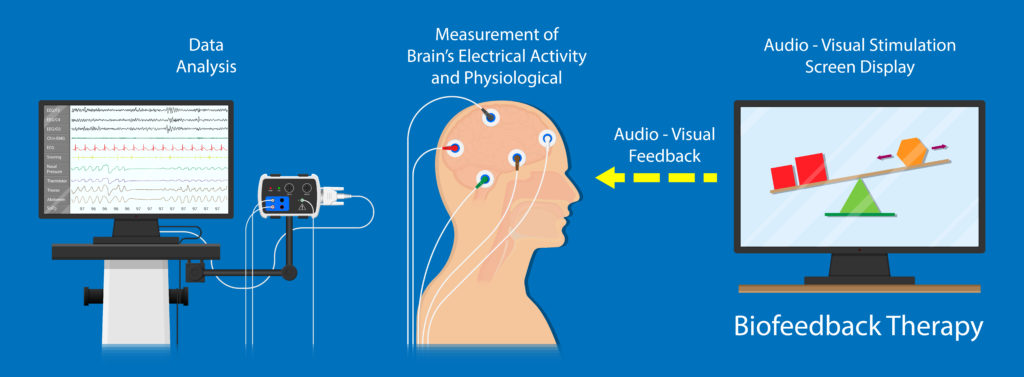
Attention Deficit Hyperactivity Disorder, ADHD
Some people do not outgrow ADHD, though symptoms can decrease with age in some. ADHD can also cause struggles for people stemming from academic failure and judgment by other people. ADHD kids can also have trouble interacting with their peers.
Contact our New Patient Coordinator
for more information. Or fill out the form below.
The Brain Treatment Center Dallas Can Help With ADHD
Attention-Deficit/Hyperactivity Disorder or ADHD, formerly known as ADD, affects millions of children and usually continues into adulthood. ADHD involves a combination of problems, such as difficulty paying attention, impulsive behavior, and hyperactivity. Complications can include relationship troubles, poor school performance, learning disorders, and low self-esteem.
For patients with ADHD, we offer a treatment modality called Neurofeedback. Not only is it effective, but it is also non-pharmaceutical.
Neurofeedback has been used for decades and has scientific research backing its use. And this treatment has shown great success for patients suffering from ADHD. Benefits achieved through Neurofeedback include:
- Improved sleep
- More energy and motivation
- Improved concentration
- Improved focus
- More relaxed and calm
- Improvement in overall mood
- Reduces/eliminates the need for pharmaceuticals
King’s College London: Neurobiology Animation of a Brain with ADHD
This animation from King’s College London shows the scientific basis for attention deficit hyperactivity disorder (ADHD). Based on currently available peer-reviewed research, the animation aims to show the differences in brain structure and function between people with ADHD and those without the condition.
There are known genetic links associated with ADHD and, with advances in technology, it is now possible to demonstrate clear differences in the development and structure of the brain in patients with ADHD compared to those who do not have the condition. To date, evidence to show the neurobiological basis of ADHD has not always been collated and portrayed in a friendly format. This animation allows people to ‘see’ what is happening in the brain to link this to what the patient experiences and help dispel the myths around ADHD.”
Dr. Mitul Mehta, Senior Lecturer at the Centre for Neuroimaging Sciences at the Institute of Psychiatry, King’s College London
Symptoms of ADHD
- Failure to pay attention to details can cause problems in school
- Having trouble focusing in general
- Failure to listen
- Lack of follow-through on schoolwork, chores, or other tasks
- Lack of organizational skills
- No interest in things that require focus
- Easily distracted
- Forgetfulness
- Being fidgety or squirmy
- Hyperactivity and inability to be still
- Talks too much
- Interrupts others who are talking or engaged in other activities
- Impatience
- Difficulty learning because of poor attention span
Currently, there is no known cause for ADHD, however, research is ongoing. We know that genetics may be involved, but the environment or problems with the central nervous system can also contribute.
Studies have been completed regarding the link between gut health and ADHD; preliminary research has shown a connection between the two. Additionally, some studies indicate certain food preservatives or dyes can also contribute to attention disorders in children.
The classic triad of ADHD symptoms are inattention, impulsiveness, and hyperactivity or restlessness. Although ADD is a well-established brain disorder, the diagnosis remains controversial. Attention deficit disorder has been called a fad, not a legitimate diagnosis, but it is a well-established, well-documented, medical condition that can cause much suffering if left untreated. At one time we thought children would outgrow ADHD at puberty, but we now know that many will continue to have residual symptoms throughout adolescence and adulthood. If left untreated, ADHD can interfere with relationships, employment, and self-esteem.”
It is not a one-size-fits-all approach, which makes it significantly more effective in treating disorders of the brain and central nervous system. Neurofeedback is also a way of treating ADHD without medication.
What is Neurofeedback and How Can it Help ADHD?
Neurofeedback is a treatment modality that offers a solution for patients wanting an alternative treatment to medications.
It is a method of training an individual’s brainwaves to respond to their unique brainwave activity through the use of biofeedback. It addresses disorders of the brain by moderating brainwaves, thus easing ADHD symptoms.
Neurofeedback training has been used in clinical settings for over 50 years and is backed by many scientific studies as being effective in treating certain brain and central nervous system disorders.
What makes neurofeedback unique is that each patient undergoes a qEEG or a “brain mapping” session before beginning their treatment. In this way, treatment is tailored for the patient based on their own brainwave patterns.

Conventional Treatment for ADHD
Stimulant medications are commonly prescribed to treat ADHD. These seem to balance the levels of some neurotransmitters in the brain and can help improve symptoms. They include amphetamines such as Dexedrine, Adderall, and Vyvanse, along with methylphenidates such as Concerta, Ritalin, and Focalin. These drugs do not cure ADHD, but they can help to ease symptoms.
Certain non-stimulant antidepressants are sometimes prescribed; however, these drugs work more slowly and also come with risks.
Stimulants can cause heart problems and psychiatric problems. Antidepressants, when taken by children or teens, also carry an increased risk of suicidal thinking.
There are no contraindications for anyone wishing to undergo neurofeedback training.
Contact our New Patient Coordinator
for more information. Or fill out the form below.
We Use the Most Technologically Advanced Neurofeedback Equipment
At Brain Treatment Center Dallas, we offer NeuroGuide 19-Channel neurofeedback. Different systems offer a different number of channels, and ours is one of the most technologically updated systems available. It offers more visibility to the brain, allows a 3D image to be generated, and you can see the brain connections being made. It’s more comprehensive and allows for in-depth reporting and more ways to train.
A neurofeedback session compares what your brain should be doing to what it is actually doing. A typical appointment uses a computer screen in the form of a video game, movie, or music. You wear the EEG cap as the movie or video game plays on the screen in order to approach your brain’s desired state. When the screen stops, it means your brain is going in a different direction than the task at hand. Over time, your brain is “trained” to stay focused, relax, etc., so that it will automatically stay this way once you have completed the neurofeedback training sessions.
Once you complete the scheduled number of sessions, the treatment’s effects are long-lasting. Because symptoms are alleviated, the need for medications is eliminated or significantly decreased.
The TMS equipment used is FDA-cleared to treat Major Depressive Disorder and OCD and is used off-label to treat other neurological-related conditions, including ADHD.
What is a qEEG (Quantitative Electroencephalogram)?
A qEEG, or “Brain Map,” is a painless assessment of a patient’s brainwaves. The qEEG is the core of our evaluation and identifies brain dysregulation so that we can customize a treatment plan for each person.
To do this, we place a rubber cap on your head to measure brainwave activity at 19 different locations on the scalp. The qEEG also shows how brainwaves at one location communicate with those at other locations, providing an accurate measure of power, consistency, and speed. It provides data about how YOUR brain supports emotions and cognitive abilities and allows us to design a method to “train” your brain.
The qEEG measures the activity of all the brainwaves and compares them to an extensive database of what “normal” brainwaves are supposed to look like. If brainwaves of any category are abnormal, this causes dysregulation, which translates into symptoms that you may be experiencing, such as hyperactivity, inability to focus, inability to relax, and more. For example, too much Theta wave activity can indicate that a patient has ADHD.
Contact our New Patient Coordinator
for more information. Or fill out the form below.
After undergoing your qEEG, we can begin your treatment protocol. You will have an additional debriefing appointment with Kristen approximately one week later and then again at the end of your entire treatment process.
Our Neurofeedback Protocols
Neurofeedback can be used to treat a variety of disorders associated with the brain and central nervous system. Here at the Brain Treatment Center Dallas, we use the protocol to treat patients with ADHD, sleep disorders, and those who want to improve their focus and calm their minds.
We treat patients with these conditions who are eight years and older.
The first appointment will be for your qEEG/brain mapping, which will last from an hour and a half to two hours. The qEEG will involve recording sessions that require you to close your eyes for some of the time and keep them open for others. This is a completely painless test, and we will be with you the entire time to guide you through the process.
The second step in the neurofeedback process is to have a clinical consultation with Kristen Elliott, our board-certified Neurofeedback Director at the Brain Treatment Center. This appointment usually takes about 45 minutes. She will go over the neurofeedback process and what to expect during a typical treatment plan. She will also help you determine if this is a recommended plan for you or your child based on your health needs and goals.
Your Neurofeedback Training Sessions
These sessions generally last from 45 minutes to one hour, and we recommend that you attend your sessions twice a week to get the most out of your training.
Additionally, we require that you complete at least 20 training sessions with us. We consider this an “assessment period,” and you should start to realize some benefits of the neurofeedback at the end of this time. In most cases, for the best and longest-lasting results, it will take 30 to 40 sessions to complete your neurofeedback therapy.
If you are taking medications for your specific condition, we advise that you keep your prescribing provider apprised of your progress since, in most cases, you will need less medication as you go through the neurofeedback training. It is extremely important that you advise us of all the medications that you are taking before beginning your treatment protocols.
Kristen will be with you during your training sessions, and you will wear an EEG cap at each training session, plugged into the screen that you are watching. As you follow the instructions on the screen, the system will “reward” you. If your attention wanes, the system will slow its operation or stop altogether, thus helping to “train your brain.”
What makes this particularly effective is that YOU control what happens during your training session, and you will also be able to see the results in real-time.
The important thing to remember is that neurofeedback training is cumulative, with each session building on the last. Your participation and commitment are required for the overall success of your therapy.
Are You a Candidate for Neurofeedback?
If you have problems focusing, experience hyperactivity, or have trouble relaxing and sleeping, then neurofeedback can be an effective means of treatment. As you progress through your treatment sessions, you will usually start to feel calmer at first and then more focused as training continues.
You will notice a difference in your behavior and thought patterns in as little as five or six sessions. As you complete more sessions, you will notice that these benefits last for a day or two. After about 20 sessions, benefits should last a week or more. After completing your recommended amount of training sessions specifically for your condition and individual case, treatment is long-lasting, and the need for medications drastically decreases or is eliminated.
Possible Side Effects
Patients may experience some side effects after going through a neurofeedback training session, but they are generally mild and last only a few hours. Side effects may include:
- Mild headache
- Fatigue
- Irritability
- Agitation
- Impaired focus
- Heightened anxiety
These types of side effects are normal for patients going through any type of treatment that modulates the brainwaves and will generally lessen as the patient goes through more sessions.
Guidelines and Recommendations for Neurofeedback Training
While there are no contraindications for undergoing neurofeedback, there are things that can decrease its effectiveness or the ability to get a clean qEEG. Based on this, we recommend the following:
- Disclose all medications that you are taking.
- Do not use alcohol or marijuana within 24 hours of the qEEG appointment.
- Do not use excessive caffeine in the three to four hours prior to the qEEG, and do not have a cigarette (if you smoke) within one hour of the qEEG.
- To prepare for making good connections with the scalp during qEEG and training sessions, please do not use hair gels, sprays, baby shampoos, or medical shampoos.
- Eat a high-protein snack prior to your qEEG and training sessions, but try to avoid turkey since this may interfere with your energy levels.
- Avoid sweets or processed foods prior to your qEEG and training sessions.
- Do NOT use street drugs or marijuana while undergoing training, as they will interfere with progress by as much as 50%.
- Limit alcohol intake throughout treatment duration and do not drink on days of training sessions, as alcohol can negatively affect sleep and slow down training progress.
- Please advise of your complete medical history along with any symptoms that you are experiencing on your intake paperwork.
About Us
Our Philosophy
We explore the concept that the brain can be treated by physical means that are not chemical. Dr. Miller explores the relationship between cognition and neural activity. This is an innovative and informed approach to neuromodulation. Our team of neuroscientists and physicians believe in delivering individualized treatment. This allows us to achieve a healthier life for those with various neurological issues.
Our Goal
Our evidence-based methodology is unique because we focus on the physiology of the brain. We are able to map and reveal communications in the brain’s neural networks. As a result, we’re able to take a personalized an targeted approach to treatment. We base this on your brain rhythm to encourage healthy brain communication activity. Our goal is to empower minds.
Meet the Team
Dr. Miller and his talented team members are among the top in their field. They will do everything possible to achieve exceptional results for you.
Our specialist-trained team takes the greatest care with our patients. It’s exciting to see the results that patients have been experiencing as a result of the treatment. There are so many people who can benefit from this technology, and we are excited to help as many people as we can.
Our Neurofeedback Specialists
Spencer O. Miller, MD, is a Board-Certified Neurologist in Dallas, Texas. He received his medical degree from the University of Mississippi School of Medicine and has been in practice for 12 years. He spent five of those years in the US Air Force, where he saw many brain injuries, including soldiers suffering from PTSD and TBI.
Dr. Miller specializes in the treatment of ADHD, sleep disorders, traumatic brain injury, depression, post-traumatic stress disorder, dementia, autism, and multiple other brain disorders at his clinic, the Brain Treatment Center Dallas.
Our clinic offers MeRT® (Magnetic e-Resonance Therapy) for conditions such as depression, autism, post-traumatic stress disorder, traumatic brain injury, dementia, and brain complication after-effects of COVID-19. We offer neurofeedback for those suffering from ADHD.
Kristen Elliott, NeuroFeedback Clinical Director
Kristen Elliott, MA, LPC, BCPCC, BCN, IM-C, is Board-certified in neurofeedback. She is our Neurofeedback Clinical Director here at the Brain Treatment Center Dallas. She is also a brain health coach.
Kristen received her degree in psychology at Colorado State University in 2007 and her master’s degree in counseling from Southwestern Baptist Theological Seminary in 2011. Before arriving at The Brain Treatment Center Dallas, Kristen was at a private practice in Fort Worth for 10 years. There, she served clients suffering from ADHD, depression, anxiety, mTBI, and autism, using an integrated model of qEEG-guided neurofeedback, faith-based counseling, and brain health coaching.
Contact our New Patient Coordinator for More Information about MeRT
When many patients come to see us, they have lost hope as they don’t see any light at the end of the tunnel.
It’s rewarding as a practitioner to help so many people realize a much better “normal” and improved quality of life.
If you have questions or would like to discuss our treatment protocols, we offer a free consultation by phone.
Our New Patient Coordinator will take the time to listen and explain. She is able to answer most questions and discuss our protocols, scheduling, fees, and other information. She is happy to assist you in any way she can.
Please call us to get more information about how our clinic and Dr. Miller may help you with your health goals and to schedule an initial screening to see if MeRT may be an option.
Contact our New Patient Coordinator
for more information. Or fill out the form below.

Contact Form
"*" indicates required fields